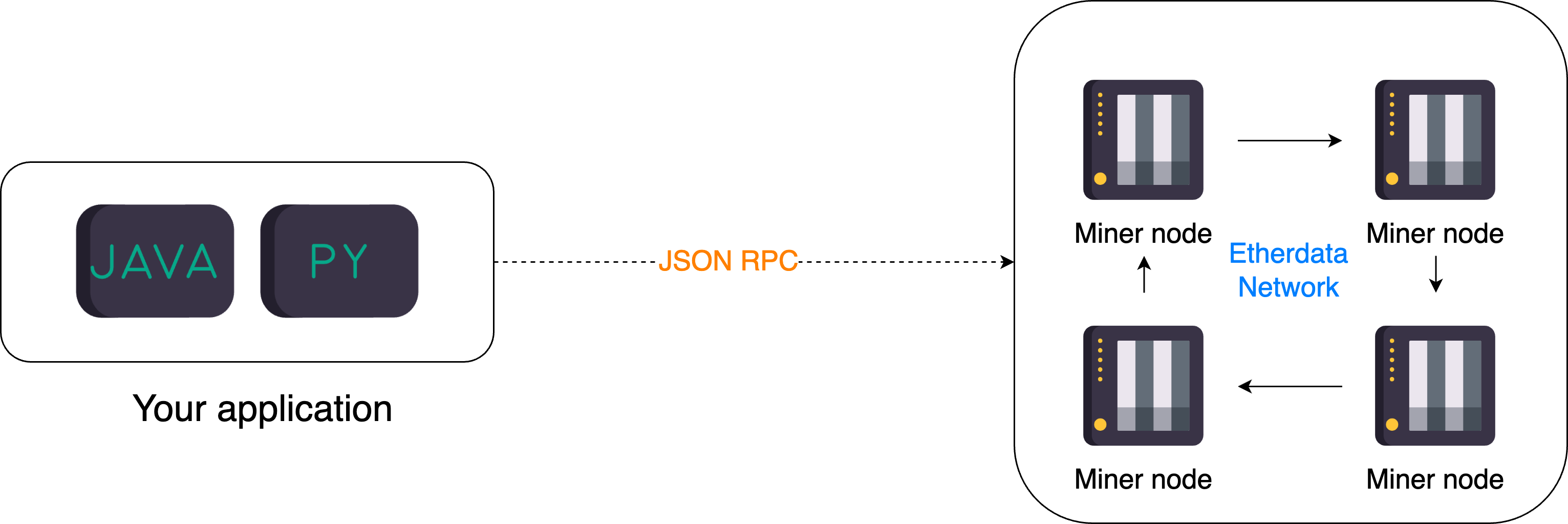Introduction to RPC method
JSON RPC or JSON Remote Procedure Call is a protocol that allows a client to call a method on a server and get a response back. It is a stateless protocol, which means that the server does not need to keep track of the client.
- The client can call any method on the server and the server can call any method on the client.
- The client and server can be on the same machine or on different machines.
- The client and server can be written in different programming languages.
It is widely used in dApp development. For example, the MetaMask uses JSON RPC to communicate with the Ethereum node to get the current account balance, latest transaction information, etc.

Diagram illustrating the JSON RPC protocol
Other SDKs like web3.py, web3.swift, web3j and web3.js also use JSON RPC to communicate with the Ethereum node. It wraps the JSON RPC calls into a more user-friendly API in each language.
JSON RPC request
A JSON RPC request is a JSON object with the following fields:
jsonrpc: A string specifying the version of the JSON RPC protocol. The current version is "2.0".method: A string containing the name of the method to be invoked.params: An array of objects to pass as arguments to the method.id: The request id. This can be of any type. It is used to match the response with the request that it is replying to.
For example, the following is a JSON RPC request to call the eth_getBlockByNumber method and get the latest block:
{
"jsonrpc": "2.0",
"method": "eth_getBlockByNumber",
"params": ["latest", false],
"id": "1"
}
The returned result is a JSON object with the following fields:
jsonrpc: A string specifying the version of the JSON RPC protocol. The current version is "2.0".id: The request id. This must be the same id as the request it is replying to.result: On success, this contains the result of the method call. The result can be any JSON type, including an object, array or a primitive type. On error, this contains the error object.
The result from previous call is
{
"jsonrpc": "2.0",
"id": "1",
"result": {
"difficulty": "0xa7523f",
"extraData": "0xd883010c07846765746888676f312e31372e38856c696e7578",
"gasLimit": "0x7a1200",
"gasUsed": "0x0",
"hash": "0xbb9156cc6ee2d94e9876cf8a3d0e0b9b859b41955aeb1e377003376358661751",
"logsBloom": "0x00000000000000000000000000000000000000000000000000000000000000000000000000000000000000000000000000000000000000000000000000000000000000000000000000000000000000000000000000000000000000000000000000000000000000000000000000000000000000000000000000000000000000000000000000000000000000000000000000000000000000000000000000000000000000000000000000000000000000000000000000000000000000000000000000000000000000000000000000000000000000000000000000000000000000000000000000000000000000000000000000000000000000000000000000000000",
"miner": "0x4274108530b88769d4738d9c12f13b04bd3eb01a",
"mixHash": "0x0ea7c1bb8afe039f5b0e95e1d9096e6997ce4ad973f11ded4c9e66be50ee9ba3",
"nonce": "0x6b84ffabd2fed5cb",
"number": "0x382751",
"parentHash": "0xeff95c83c9b869003cc035e99d79780e136014509ae92a1c47c67dc1ea5d4221",
"receiptsRoot": "0x56e81f171bcc55a6ff8345e692c0f86e5b48e01b996cadc001622fb5e363b421",
"sha3Uncles": "0x1dcc4de8dec75d7aab85b567b6ccd41ad312451b948a7413f0a142fd40d49347",
"size": "0x21b",
"stateRoot": "0x6ea32d045bc41b7e9421e1ba3cc4a19c7a7d3a3c956cea77679f815385aa9a34",
"timestamp": "0x635752d4",
"totalDifficulty": "0x158d3119e4e3c4",
"transactions": [],
"transactionsRoot": "0x56e81f171bcc55a6ff8345e692c0f86e5b48e01b996cadc001622fb5e363b421",
"uncles": []
}
}
JSON RPC example using JavaScript
Assume that we have a function defined below:
function add(a: number, b: number): number {
return a + b;
}
Then we export this function using json rpc so that other programs can call it using the following data structure.
{
"jsonrpc": "2.0",
"method": "add",
"params": [1, 2],
"id": "1"
}
As you see the name of the function is add which is the same as the method name in the JSON RPC request.
And the result is
{
"jsonrpc": "2.0",
"id": "1",
"result": 3
}
Then we can use the JSON RPC request to call the add function from another programming language like python.
Suppose that the JSON RPC server is running on localhost:3000.
import requests
import json
url = "http://localhost:3000"
headers = {'content-type': 'application/json'}
payload = {
"jsonrpc": "2.0",
"method": "add",
"params": [1, 2],
"id": "1"
}
response = requests.post(url, data=json.dumps(payload), headers=headers).json()
print(response) # {'jsonrpc': '2.0', 'id': '1', 'result': 3}